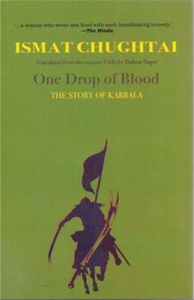Namrata reviews One Drop of Blood by Ismat Chugtai based on the battle of Karbala.

Published by Women Unlimited (An Associate of Kali for Women), 2020
Featured in Hindustan Times as one of the interesting books early this year, One Drop of Blood by Ismat Chugtai is a unique book in many ways. Firstly, it is the last work of Ismat Chugtai and secondly, it so different from her usual line of work.
One drop of Blood is based on the battle of Karbala fought in 680 A.D. in present-day Iraq between Yazid, the reigning Caliph and his mighty soldiers and Imam Husain, the grandson of Prophet Muhammad with his small army. According to the Islamic calendar Muharram is the first month of the year and the second holiest month, after the month of Ramzan. Muharram is also a period of mourning the martyrdom of Imam Husain and his family (including his infant grandchild) in the battle of Karbala.
As she herself states in an interview,
“The tragedy behind the pageantry of Muharram commemoration forced me to think that there are so many festivals celebrated in the world, like Dussehra or Christmas, but Muharram is the only commemoration that takes place in remembrance of the cruelties inflicted upon innocent people.” (Pg. viii)
This tour de force has been translated into English by Tahira Naqvi who is a Senior Lecturer (Urdu Language) at the New York Universiry and has translated works of Munshi Premchand, Saadat Hasan Manto and Khadija Mastoor apart from Ismat Chugtai.
Read full review on Kitaab.